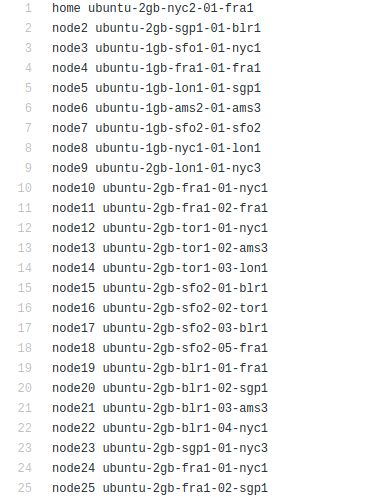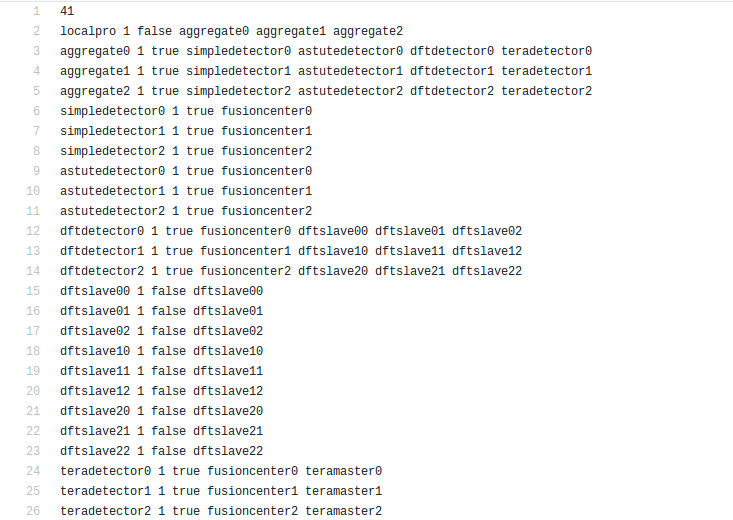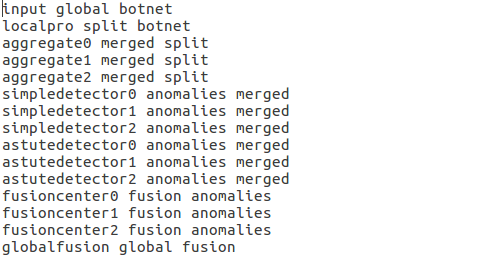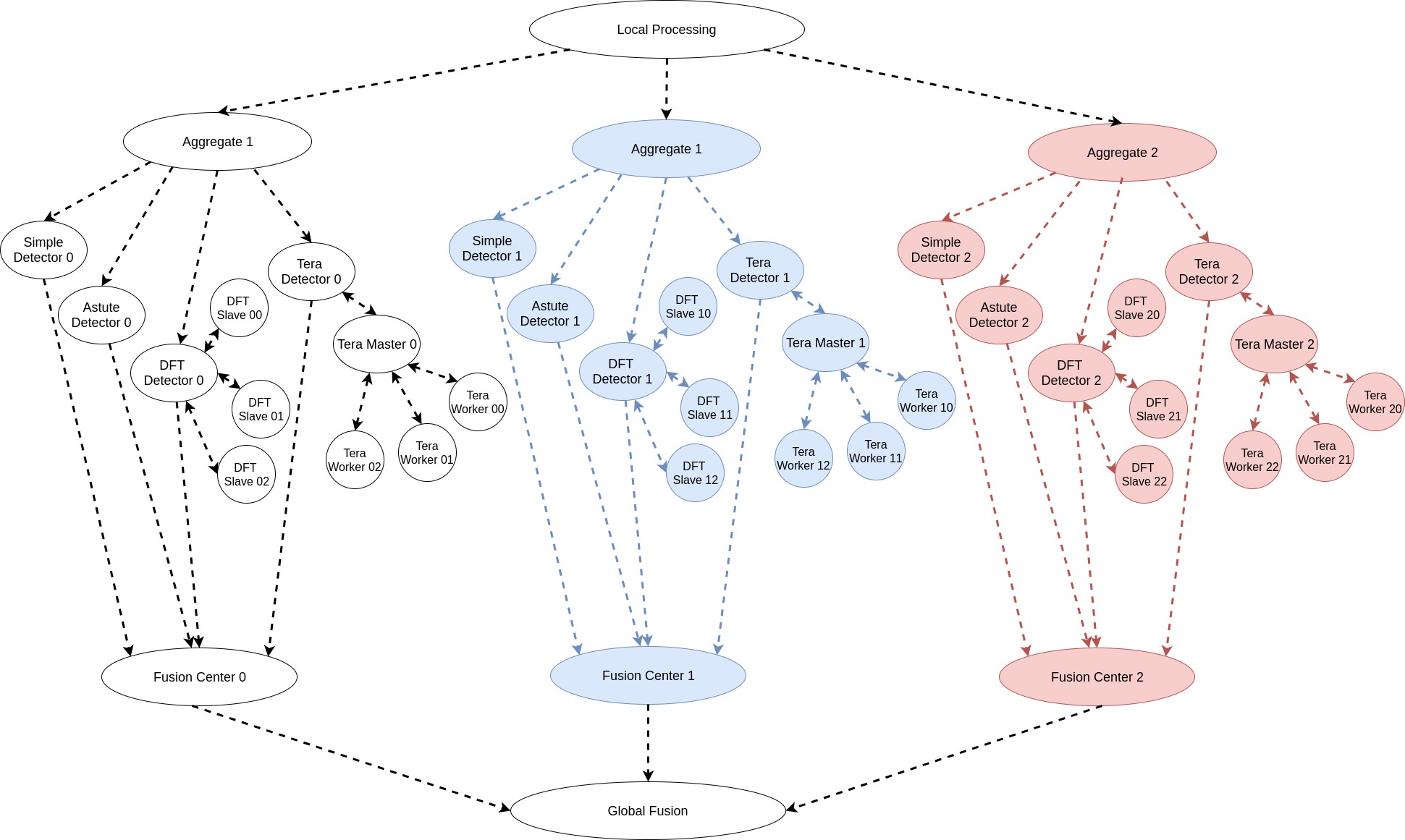Applications¶
Quick Integration¶
In order to integrate your applications with Jupiter, there are some requirements in format and syntax for the inputs, outputs and task scripts.
Files nodes.txt, jupiter_config.py and config.ini are found in the main folder of Jupiter and should be updated based on the requirements of users. Files app_config.ini, configurations.txt and name_convert.txt should be present in the application folder to support different Jupiter modules to work properly.
Input - File nodes.txt¶
This file lists all the nodes, line by line, in the following format:
| home | nodename |
|---|---|
| node2 | nodename |
| node3 | nodename |
| node4 | nodename |
A given sample of node file:

Warning
There are 2 kind of nodes: home node and compute node. Home nodes start with home, which allow stream of incoming data for the given DAG tasks as well as store all statistical performance information. Compute nodes start with node, which will perform scheduling tasks and compute tasks. In the case of nonpricing CIRCE dispatcher, only 1 home node is supported. In the case of pricing CIRCE dispatcher (Event driven or Pushing scheme), multiple home nodes are supported. The home node list should be as followed: home, home2, home3.
Input - File jupiter_config.py¶
This file includes all paths configuration for Jupiter system to start. The latest version of jupiter configuration file:
1 2 3 4 5 6 7 8 9 10 11 12 13 14 15 16 17 18 19 20 21 22 23 24 25 26 27 28 29 30 31 32 33 34 35 36 37 38 39 40 41 42 43 44 45 46 47 48 49 50 51 52 53 54 55 56 57 58 59 60 61 62 63 64 65 66 67 68 69 70 71 72 73 74 75 76 77 78 79 80 81 82 83 84 85 86 87 88 89 90 91 92 93 94 95 96 97 98 99 100 101 102 103 104 105 106 107 108 109 110 111 112 113 114 115 116 117 118 119 120 121 122 123 124 125 126 127 128 129 130 131 132 133 134 135 136 137 138 139 140 141 142 143 144 145 146 147 148 149 150 151 152 153 154 | global STATIC_MAPPING, SCHEDULER, TRANSFER, PROFILER, RUNTIME, PRICING, PRICE_OPTION
STATIC_MAPPING = int(config['CONFIG']['STATIC_MAPPING'])
# scheduler option chosen from SCHEDULER_LIST
SCHEDULER = int(config['CONFIG']['SCHEDULER'])
# transfer option chosen from TRANSFER_LIST
TRANSFER = int(config['CONFIG']['TRANSFER'])
# Network and Resource profiler (TA2) option chosen from TA2_LIST
PROFILER = int(config['CONFIG']['PROFILER'])
# Runtime profiling for data transfer methods: 0 for only senders, 1 for both senders and receivers
RUNTIME = int(config['CONFIG']['RUNTIME'])
# Using pricing or original scheme
PRICING = int(config['CONFIG']['PRICING'])
# Pricing option from pricing option list
PRICE_OPTION = int(config['CONFIG']['PRICE_OPTION'])
"""Authorization information in the containers"""
global USERNAME, PASSWORD
USERNAME = config['AUTH']['USERNAME']
PASSWORD = config['AUTH']['PASSWORD']
"""Port and target port in containers for services to be used: Mongo, SSH and Flask"""
global MONGO_SVC, MONGO_DOCKER, SSH_SVC, SSH_DOCKER, FLASK_SVC, FLASK_DOCKER
MONGO_SVC = config['PORT']['MONGO_SVC']
MONGO_DOCKER = config['PORT']['MONGO_DOCKER']
SSH_SVC = config['PORT']['SSH_SVC']
SSH_DOCKER = config['PORT']['SSH_DOCKER']
FLASK_SVC = config['PORT']['FLASK_SVC']
FLASK_DOCKER = config['PORT']['FLASK_DOCKER']
"""Modules path of Jupiter"""
global NETR_PROFILER_PATH, EXEC_PROFILER_PATH, CIRCE_PATH, HEFT_PATH, WAVE_PATH, SCRIPT_PATH, CIRCE_ORIGINAL_PATH
# default network and resource profiler: DRUPE
# default wave mapper: random wave
NETR_PROFILER_PATH = HERE + 'profilers/network_resource_profiler/'
EXEC_PROFILER_PATH = HERE + 'profilers/execution_profiler/'
CIRCE_PATH = HERE + 'circe/pricing/'
HEFT_PATH = HERE + 'task_mapper/heft/original/'
WAVE_PATH = HERE + 'task_mapper/wave/random_wave/'
SCRIPT_PATH = HERE + 'scripts/'
global mapper_option
mapper_option = 'heft'
if SCHEDULER == int(config['SCHEDULER_LIST']['WAVE_RANDOM']):
print('Task mapper: Wave random selected')
WAVE_PATH = HERE + 'task_mapper/wave/random_wave/'
mapper_option = 'random'
elif SCHEDULER == int(config['SCHEDULER_LIST']['WAVE_GREEDY']):
print('Task mapper: Wave greedy selected')
WAVE_PATH = HERE + 'task_mapper/wave/greedy_wave/'
mapper_option = 'greedy'
elif SCHEDULER == int(config['SCHEDULER_LIST']['HEFT_MODIFIED']):
print('Task mapper: Heft modified selected')
HEFT_PATH = HERE + 'task_mapper/heft/modified/'
mapper_option = 'modified'
else:
print('Task mapper: Heft original selected')
global pricing_option, profiler_option
pricing_option = 'pricing' #original pricing
profiler_option = 'onehome'
if PRICING == 1:#multiple home (push circe)
pricing_option = 'pricing_push'
profiler_option = 'multiple_home'
NETR_PROFILER_PATH = HERE + 'profilers/network_resource_profiler_mulhome/'
EXEC_PROFILER_PATH = HERE + 'profilers/execution_profiler_mulhome/'
HEFT_PATH = HERE + 'task_mapper/heft_mulhome/original/'
WAVE_PATH = HERE + 'task_mapper/wave_mulhome/greedy_wave/'
print('Pricing pushing scheme selected')
if PRICING == 2:#multiple home, pricing (event-driven circe)
pricing_option = 'pricing_event'
profiler_option = 'multiple_home'
NETR_PROFILER_PATH = HERE + 'profilers/network_resource_profiler_mulhome/'
EXEC_PROFILER_PATH = HERE + 'profilers/execution_profiler_mulhome/'
HEFT_PATH = HERE + 'task_mapper/heft_mulhome/original/'
WAVE_PATH = HERE + 'task_mapper/wave_mulhome/greedy_wave/'
print('Pricing event driven scheme selected')
CIRCE_PATH = HERE + 'circe/%s/'%(pricing_option)
if PRICING == 0: #non-pricing
CIRCE_PATH = HERE + 'circe/original/'
NETR_PROFILER_PATH = HERE + 'profilers/network_resource_profiler_mulhome/'
EXEC_PROFILER_PATH = HERE + 'profilers/execution_profiler_mulhome/'
HEFT_PATH = HERE + 'task_mapper/heft_mulhome/original/'
WAVE_PATH = HERE + 'task_mapper/wave_mulhome/greedy_wave/'
print('Non pricing scheme selected')
"""Kubernetes required information"""
global KUBECONFIG_PATH, DEPLOYMENT_NAMESPACE, PROFILER_NAMESPACE, MAPPER_NAMESPACE, EXEC_NAMESPACE
KUBECONFIG_PATH = os.environ['KUBECONFIG']
# Namespaces
DEPLOYMENT_NAMESPACE = 'johndoe-circe'
PROFILER_NAMESPACE = 'johndoe-profiler'
MAPPER_NAMESPACE = 'johndoe-mapper'
EXEC_NAMESPACE = 'johndoe-exec'
""" Node file path and first task information """
global HOME_NODE, HOME_CHILD
HOME_NODE = get_home_node(HERE + 'nodes.txt')
HOME_CHILD = 'sample_ingress_task1'
"""pricing CIRCE home and worker images"""
global PRICING_HOME_IMAGE, WORKER_CONTROLLER_IMAGE, WORKER_COMPUTING_IMAGE
PRICING_HOME_IMAGE = 'docker.io/johndoe/%s_circe_home:coded' %(pricing_option)
WORKER_CONTROLLER_IMAGE = 'docker.io/johndoe/%s_circe_controller:coded' %(pricing_option)
WORKER_COMPUTING_IMAGE = 'docker.io/johndoe/%s_circe_computing:coded' %(pricing_option)
"""CIRCE home and worker images for execution profiler"""
global HOME_IMAGE, WORKER_IMAGE
HOME_IMAGE = 'docker.io/johndoe/circe_home:coded'
WORKER_IMAGE = 'docker.io/johndoe/circe_worker:coded'
"""DRUPE home and worker images"""
global PROFILER_HOME_IMAGE, PROFILER_WORKER_IMAGE
PROFILER_HOME_IMAGE = 'docker.io/johndoe/%s_profiler_home:coded'%(profiler_option)
PROFILER_WORKER_IMAGE = 'docker.io/johndoe/%s_profiler_worker:coded'%(profiler_option)
"""WAVE home and worker images"""
global WAVE_HOME_IMAGE, WAVE_WORKER_IMAGE
#coded: random, v1: greedy
WAVE_HOME_IMAGE = 'docker.io/johndoe/%s_%s_wave_home:coded' %(mapper_option,profiler_option)
WAVE_WORKER_IMAGE = 'docker.io/johndoe/%s_%s_wave_worker:coded' %(mapper_option,profiler_option)
"""Execution profiler home and worker images"""
global EXEC_HOME_IMAGE, EXEC_WORKER_IMAGE
EXEC_HOME_IMAGE = 'docker.io/johndoe/%s_exec_home:coded'%(profiler_option)
EXEC_WORKER_IMAGE = 'docker.io/johndoe/%s_exec_worker:coded'%(profiler_option)
"""HEFT docker image"""
global HEFT_IMAGE
HEFT_IMAGE = 'docker.io/johndoe/%s_heft:coded'%(profiler_option)
"""Application Information"""
global APP_PATH, APP_NAME
APP_PATH = HERE + 'app_specific_files/network_monitoring_app/'
APP_NAME = 'app_specific_files/network_monitoring_app'
|
Warning
You need to create required namespaces in your Kubernetes cluster that will be dedicated to the profiler, scheduling mapper (to choose specific scheduling algorithms from HEFT, Random WAVE, greedy WAVE), and CIRCE deployments (non-pricing, pricing event driven or pricing push), respectively. You also need to update your namespace information correspondingly.
1 2 3 4 | DEPLOYMENT_NAMESPACE = 'johndoe-circe'
PROFILER_NAMESPACE = 'johndoe-profiler'
MAPPER_NAMESPACE = 'johndoe-mapper'
EXEC_NAMESPACE = 'johndoe-exec'
|
You also need to specify the corresponding information:
- CIRCE images :
HOME_IMAGEandWORKER_IMAGE - Pricing CIRCE images :
PRICING_HOME_IMAGE,WORKER_CONTROLLER_IMAGEandWORKER_COMPUTING_IMAGE - DRUPE images :
PROFILER_HOME_IMAGEandPROFILER_WORKER_IMAGE - Execution profiler images:
EXEC_HOME_IMAGEandEXEC_WORKER_IMAGE - HEFT images:
HEFT_IMAGE - WAVE images :
WAVE_HOME_IMAGEandWAVE_WORKER_IMAGE - Initial task :
HOME_CHILD - The application folder :
APP_PATH. The tasks specific files is recommended to be put in the foldertask_specific_files.
Input - File config.ini¶
This file includes all configuration options for Jupiter system to start. The latest version of config.ini file includes types of mapping (static or dynamic), port information (SSH, Flask, Mongo), authorization (username and password), scheduling algorithm (HEFT original, random WAVE, greedy WAVE, HEFT modified):
1 2 3 4 5 6 7 8 9 10 11 12 13 14 15 16 17 18 19 20 21 22 23 24 25 26 27 28 29 30 31 32 33 34 35 36 37 38 | [CONFIG]
STATIC_MAPPING = 0
SCHEDULER = 1
TRANSFER = 0
PROFILER = 0
RUNTIME = 1
PRICING = 1
PRICE_OPTION = 0
[PORT]
MONGO_SVC = 6200
MONGO_DOCKER = 27017
SSH_SVC = 5000
SSH_DOCKER = 22
FLASK_SVC = 6100
FLASK_DOCKER = 8888
[AUTH]
USERNAME = root
PASSWORD = PASSWORD
[OTHER]
MAX_LOG = 10
SSH_RETRY_NUM = 20
TASK_QUEUE_SIZE = -1
[SCHEDULER_LIST]
HEFT = 0
WAVE_RANDOM = 1
WAVE_GREEDY = 2
HEFT_MODIFIED = 3
[PROFILERS_LIST]
DRUPE = 0
[TRANSFER_LIST]
SCP = 0
[PRICING_LIST]
NONPRICING = 0
PUSH_MULTIPLEHOME = 1
DRIVEN_MULTIPLEHOME = 2
[PRICING_FUNCTION_LIST]
SUM = 1
MAX = 2
|
Warning
You can specify the following values:
PRICINGinCONFIGsection to choose the specific CIRCE dispatcher from thePRICING_LIST. There are three kinds of CIRCE dispatcher:NONPRICING,PUSH_MULTIPLEHOMEandDRIVEN_MULTIPLEHOME.SCHEDULERinCONFIGsection to choose the specific scheduling algorithm from theSCHEDULER_LIST.STATIC_MAPPINGis only chosen on testing purpose.PROFILERinCONFIGsection to choose the specific network monitoring from thePROFILERS_LIST. The default network monitoring tool that we used isDRUPE. If you want to use another network monitoring tool, please refer to the guideline how to use the interface.TRANSFERinCONFIGsection to choose the specific file transfer method for Jupiter from theTRANSFER_LIST. The default file transfer method that we used isSCP. If you want to use another file transfer method, please refer to the guideline how to use the interface.
Input - File configuration.txt¶
The tasks specific files is recommended to be put in the folder task_specific_files. Inside the application folder, there should be a configuration.txt file having the DAG description. First line is an integer which gives the number of lines the DAG is taking. DAG is represented in the form of adjacency list:
1 | parent_task NUM_INPUTS FLAG child_task1 child_task2 child task3 ...
|
parent_taskis the name of the parent taskNUM_INPUTSis an integer representing the number of input files the task needs in order to start processing (some tasks could require more than input).FLAGistrueorfalse. Based on its value,monitor.pywill either send a single output of the task to all its children (when true), or it will wait the output files and start putting them into queue (when false). Once the queue size is equal to the number of children, it will send one output to one child (first output to first listed child, etc.).child_task1,child_task2,child_task3… are the names of child tasks of the current parent task.
A given sample of application configuration file:

Input - File app_config.ini¶
Inside the application folder, there should be a app_config.ini file having the required specific ports for the application. If the application does not need any specific ports, then the app_config.ini with the two sections [DOCKER_PORT] and [SVC_PORT] should be left empty. The section [SVC_PORT] should specify the required ports needed for the application, and the section [DOCKER_PORT] should specify the corresponding target ports for the docker.
1 2 3 4 | [DOCKER_PORT]
PYTHON-PORT = 57021
[SVC_PORT]
PYTHON-PORT = 57021
|
Input - File input_node.txt¶
This file is used by WAVE algorithm and provides the information of the compute node for the first task. Format of this file is given (in this case, node2 will perform the first task):
task node task0 node2
Input - File name_convert.txt¶
This file helps to output the correct performance statistics of Jupiter’s runtime profiler, which lists all the task name, its corresponding input and output file name, line by line, in the following format:
| input | output_app_name | input_app_name |
|---|---|---|
| task1 | output_task1_name | input_task1_name |
| task2 | output_task2_name | input_task2_name |
| task3 | output_task3_name | input_task3_name |
A given sample of name_convert.txt file:

Output¶
Note
Taking the node list from nodes.txt and DAG information from configuration.txt, Jupiter will consider both updated network connectivity (from DRUPE-network profiler or your chosen tool) and computational capabilities (from DRUPE - resource profiler or your chosen tool) of all the nodes in the system, Jupiter use the chosen scheduling algorithm (HEFT original, random WAVE,``greedy WAVE`` or HEFT modified) to give the optimized mapping of tasks and nodes in the system. Next, CIRCE will handle deploying the optimized mapping in the Kubernetes system.
Scripts format¶
Each task should be coded as a python script inside the scripts folder. Each code for a task must be placed inside a function called task that takes as arguments (inputfiles, inputpath, outputpath) and returns a list of output files.
A given example of a task:

In the above example, onefile parameter requires the list of input filenames to the tasks, pathin parameter requires the absolute path of the input folder, pathout parameter requires the absolute path of the output folder, and the task function returns the absolute path of the out files generated by the task itself.
Network Anomaly Detection¶
The Coded DNAD (Coded Network Anomaly Detection) is an application customized for Jupiter Orchestrator. Jupiter accepts pipelined computations described in a form of a Graph where the main task flow is represented as a Directed Acyclic Graph(DAG). Thus, one should be able separate the graph into two pieces, the DAG part and non-DAG part. Jupiter requires that each task in the DAG part of the graph to be written as a Python function in a separate file under the scripts folder. On the other hand the non-DAG tasks can be either Python function or a shell script with any number of arguments, located under the scripts folder.
Overview¶
The application task graph, shown below, is intended for dispersed computing. It is inspired from Hashdoop [1, 2], where a MapReduce framework is used for anomaly detection. We have modified the codes from [2] to suit our purpose.

Input¶
Convert the pcap file to a text file using Ipsumdump as follows:
1 | ipsumdump -tsSdDlpF -r botnet-capture-20110810-neris.pcap > botnet_summary.ipsum
|
References¶
[1] Romain Fontugne, Johan Mazel, and Kensuke Fukuda. “Hashdoop: A mapreduce framework for network anomaly detection.” Computer Communications Workshops (INFOCOM WORKSHOPS), IEEE Conference on. IEEE, 2014.
[2] Hashdoop GitHub Repository
[3] Fernando Silveira, Christophe Diot, Nina Taft, and Ramesh Govindan. “ASTUTE: Detecting a different class of traffic anomalies.” ACM SIGCOMM Computer Communication Review 40.4 (2010): 267-278.
For more information, please refer to README file of the Coded DNAD repo.